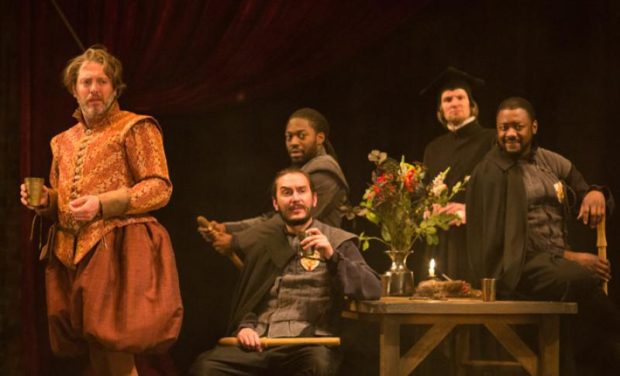You have no items in your cart. Want to get some nice things?
Go shopping
Every line in Polly Findlay’s RSC production of The Alchemist lands with effortless grace and often much mirth.
It’s 1610 and nobleman Lovewit has abandoned his house in Blackfriars for fear of the plague, leaving his faithful servant Jeremy in charge. Jeremy is, though, not as trustworthy as he seems. He reinvents himself as the charming, authoritative Face and invites conman Subtle and prostitute Dol Common to come and share his new home and put it to misuse, exploiting their greedy fellow citizens with promises of wealth, happiness and sexual success.
Designer Helen Goddard’s opening set is a strange but brilliant one: on a table in the middle of the stage is laid out a sort of still life of the Dutch masters, complete with a skull and surrounded by flickering candles and red drapes. What catches the eye, though, is the large crocodile suspended from the ceiling, way above head height. Its reason for being there – to serve as a hideaway for the gold that Face, Dol and Subtle fleece from their would-be customers – is just one of the things that shows the clever whimsy of this production.
It may be a period production but this is Jonson for the twenty-first century, and we know it from the first note. Or almost the first note, as the opening orchestral harmonies fade into the James Bond theme tune for a few fleeting bars, then “Self-Preservation Society”, then Joplin’s “The Entertainer”. This is a tale of every man for himself, though the allusion to The Italian Job doesn’t leave us with complete faith in the main protagonists, either in their motivations or their eventual success.
The dynamics of power between Ken Nwosu’s Face, Mark Lockyer’s Subtle and Siobhan McSweeney’s Dol Common move almost imperceptibly throughout, like a fly buzzing around the room and landing in different places. While their gestures in the opening minutes are not fully in keeping with their characters, their subsequent shifts, from conman to servant, alchemist to madman, prostitute to Queen of Fairies, turn on a sixpence. They hoodwink themselves that great fortune is near just as much as they con the visitors who come and go from the house, all hoping for some kind of alchemical magic to influence their lives.
Joshua McCord as Dapper, their first victim, is gleeful in his anticipation of enormous future wealth to be got with the help of the Queen of Fairy. Richard Leeming as Abel Drugger, poor sod number two, cuts a cringingly naive and oblivious figure as he asks wise Subtle how his tobacconist’s shop might flourish.
It is Ian Redford’s Sir Epicure Mammon, however, that steals the show. The biggest fool of all those that the trio swindle, such is his desire to possess the philosopher’s stone that he hands away note after gold coin after note after pewter pots and pans (to be turned into gold). Thanks to Stephen Jeffreys’ cuts to Jonson’s original script, which leaves us with a production that flies along, when longer speeches like Mammon’s do come they are all the more memorable: “My meat shall all come in, in Indian shells, / Dishes of agate set in gold, and studded / With emeralds, sapphires, hyacinths, and rubies.” These exclamations of lavish fantasy that blur wealth with pleasure and confuse flowers with precious stones work him into a frenzy of imagined pleasure and the audience into hilarity and applause.
Mammon is accompanied by Sir Pertinax Surly, who will be the threesome’s undoing. Deeply suspicious, he returns to the house as a Spanish don who apparently speaks no English. His costume is brilliantly clownlike with its garish red and yellow stripes but the clown is not he: while Tim Samuels’s Surly spurts out Spanish of effortlessly feigned intensity (albeit of random content) we in the audience squirm gleefully as the unsuspecting Face and Subtle foolishly reveal their true game in front of their new Spanish friend. Nwosu and Lockyer’s gulling is pitch perfect – they are on top of the world, unaware that they are about to come down the other side.
The Alchemist is an unapologetically chauvinist play – or, rather, its characters are – and Rosa Robson as the young widow Dame Pliant adheres to the rules of this world with her quiet presence. Her brother Kastril, played by Tom McCall, is entertaining in his role of protector, try as he does to improve his skill in quarrelling. Fortunately for his would-be adversaries, Kate Waters’ direction in the fights scenes portrays him as woefully unbending, incapable of extending his limbs far enough to even make contact with an opponent, all of which makes for excellent comedy.
The resolution of a story so many parts can sometimes feel drawn out, but not here. With the return of Lovewit to London and the truth about Face, Subtle and Dol’s activity revealed, the action is swift and driven by character, not plot. As throughout the play, the use of space is creative and realistic; even the parts of the house that can’t be seen on stage feel present.
When the curtain comes down – and it’s not the curtain you expect which, though provocative, isn’t totally in keeping with the rest of the production – it is met with disappointment that the shenanigans are over.
The Alchemist runs at the Barbican Theatre until Oct 1.

About Rosanna Boscawen
Rosanna Boscawen's short stories have been published by Liar's League and .Cent magazine, and she has written for The New York Observer, Prospect magazine and The Observer New Review. She grew up in Suffolk and now lives in London.




